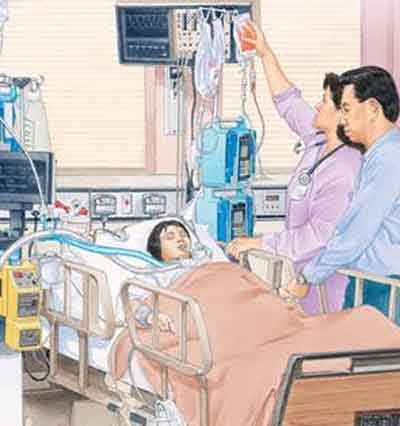- Home
- Editorial
- News
- Practice Guidelines
- Anesthesiology Guidelines
- Cancer Guidelines
- Cardiac Sciences Guidelines
- Critical Care Guidelines
- Dentistry Guidelines
- Dermatology Guidelines
- Diabetes and Endo Guidelines
- Diagnostics Guidelines
- ENT Guidelines
- Featured Practice Guidelines
- Gastroenterology Guidelines
- Geriatrics Guidelines
- Medicine Guidelines
- Nephrology Guidelines
- Neurosciences Guidelines
- Obs and Gynae Guidelines
- Ophthalmology Guidelines
- Orthopaedics Guidelines
- Paediatrics Guidelines
- Psychiatry Guidelines
- Pulmonology Guidelines
- Radiology Guidelines
- Surgery Guidelines
- Urology Guidelines
ICU-to-Home discharge not risky in select patients : JAMA

The discharge of select adult patients directly home from the ICU is not associated with increased health care utilization or increased mortality, according to a study published in the journal JAMA Internal Medicine.
Patients recovering from critical illness are commonly transferred from the intensive care unit to a hospital ward before being discharged home. These transitions allow patients to progressively receive lower-intensity care, physical and functional assessments, and rehabilitation before returning to the community. However, long waits for hospital ward beds in many health care systems have resulted in a new model of care where select patients recovering from critical illness are discharged directly home from the ICU.
Henry T. Stelfox and associates conducted a population-based cohort study to compare the health care utilization and clinical outcomes for ICU patients discharged directly home from the ICU with those of patients discharged home via the hospital ward.
The primary outcome was readmission to the hospital within 30 days of hospital discharge. The secondary outcomes were emergency department visit within 30 days and death within 1 year. Among the 6732 patients included in the study, 2826 (42%) were female with an average age of 56 years.
The researchers observed in their study that more than 1 in 10 adult patients recovering from critical illness were discharged directly home from a medical-surgical ICU. These patients had similar lengths of ICU stay, but shorter lengths of hospital stay, compared with patients discharged home via the hospital ward.
Key study findings:
- The study found that in the subsequent year, patients discharged directly home from ICU did not experience more readmissions to the hospital, emergency department visits or deaths compared with similar patients discharged home via the hospital ward.
- Among those patients discharged directly home, factors associated with readmission to the hospital or an emergency department visit within 30 days included leaving against medical advice, prescription of community supports, and discharge from an ICU with 1 or more patients discharged directly home each week.
“We recommend that ICUs develop discharge procedures that include identification of candidate patients for discharge directly home, develop protocols to facilitate the process, and train ICU clinicians (including trainees) in these procedures. Processes and outcomes of care for patients discharged directly home from the ICU should be monitored to ensure that patients are not exposed to increased risk and that any burden of care is not inappropriately shifted to the community or family,”write the authors.
The study concluded that that select adult patients recovering from critical illness are being discharged directly home from the ICU and that, compared with similar patients discharged home via the hospital ward, no important differences in posthospital health care utilization or outcomes were observed.
For reference log on to 10.1001/jamainternmed.2018.3675

Disclaimer: This site is primarily intended for healthcare professionals. Any content/information on this website does not replace the advice of medical and/or health professionals and should not be construed as medical/diagnostic advice/endorsement or prescription. Use of this site is subject to our terms of use, privacy policy, advertisement policy. © 2020 Minerva Medical Treatment Pvt Ltd